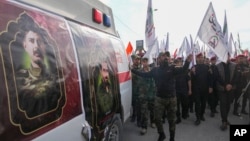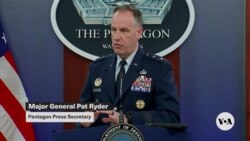The U.N.’s top envoy in Iraq on Tuesday urged all attacks to cease, warning that they could undo the country’s “hard-won stability” and other accomplishments if they continue.
“These attacks originate from within and outside of the country’s borders,” Special Representative Jeanine Hennis-Plasschaert told the U.N. Security Council.
On Friday, U.S. forces carried out precision airstrikes on three locations in Iraq as part of its efforts to eliminate the sources of nearly 170 attacks by Iranian-backed militias on U.S. military personnel in the region. Several such militias operate in Iraq.
The United States also hit four sites in neighboring Syria. In all, the Pentagon said it destroyed more than 80 individual targets.
“Rather than shows of force, all efforts should center on safeguarding Iraq from being drawn in any way into a wider conflict,” Hennis-Plasschaert said.
She warned that Iraq and the wider region “remain on a knife-edge,” and the smallest miscalculation could threaten “a major conflagration.”
Tensions are high all over the Middle East, as Israel and Hamas fight a war following the U.S.-designated terror group’s October 7 attacks inside Israel that killed 1,200 people. More than 27,000 Palestinians in the Hamas-controlled Gaza Strip have been killed in the four months the war has raged.
World leaders have warned of the risk of spillover into a wider conflict, as Iranian-backed Hezbollah fighters in south Lebanon trade shelling with Israel’s army, and Iranian-aligned Houthi rebels in Yemen attack international commercial shipping in the Red Sea, saying it is in solidarity with Gazans.
The U.N. special envoy to Iraq expressed shock over Iran’s missile strike on the Kurdish capital of Irbil a few weeks ago, in which several civilians, including a young girl, were killed.
“Meanwhile, Turkish military operations in the north also continue,” Hennis-Plasschaert said. “Just because these attacks have become the new ‘normal’ does not mean they do not seriously compound the risk of new arenas of violence being opened.”
She called on all sides to exercise maximum restraint.
“With Iraq cloaked in an already complex tapestry of challenges, it is of greatest importance that all attacks cease,” Hennis-Plasschaert said.
Iraq’s acting envoy, Abbas al-Fatlawi, denounced attacks by Turkey, Iran and the United States, saying they had caused civilian casualties and damaged private and public property.
“These attacks violate Iraq’s sovereignty and threaten the security of its people and contradict the principles and purposes of the U.N. Charter,” he told the council.
The Pentagon acknowledged that an unspecified number of militia members were likely killed or wounded in the strikes. Washington says the action was “necessary and proportionate,” consistent with international law and carried out in self-defense.
U.S. envoy Robert Wood said Iran-aligned militia groups threaten to undermine Iraq.
“Since October 2023, these groups have attacked U.S. and coalition forces in Iraq, Syria and Jordan over 165 times,” he said. “Tragically, three U.S. soldiers were killed and dozens more injured on January 28 when Iran-aligned militia groups attacked U.S. forces stationed in Jordan to take part in the fight against ISIS.”
The strikes on February 2 were directly related to the deadly attack on U.S. troops.
Washington says they are aimed at protecting and defending U.S. personnel, including those in Jordan who are supporting operations against Islamic State terrorists, to ensure the group does not resurge. It says the strikes successfully degraded the capabilities of Iranian-backed militias, deterring and undermining their ability to conduct further attacks.







